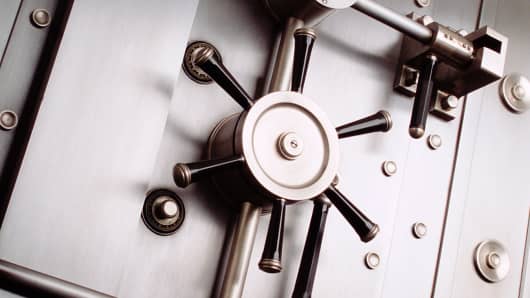The Federal Deposit Insurance Corp. reported last week that during the third quarter, U.S. banks earned $37.6 billion, for the industry's best performance since 2006. Credit quality was continuing to improve, and with most of the nation's largest banks having very strong levels of loan loss reserves, the release of reserves appears likely to continue for the next year or two, boosting bottom lines and mitigating the effect of margin pressure. The mortgage loan refinance boom is also providing a temporary boost to revenue, as the banks not only capture loan origination fees, they book gains on the quick sale of new loans to Fannie Mae and Freddie Mac.
And the
Federal Reserve
is doing what it can to make sure that investors in the nation's largest banks don't face the possibility of dividend cuts, because the regulator's stress test methodology includes a "severely adverse scenario," which will gauge the banks' abilities to pay higher dividends and repurchase shares, as per their capital plans, in the event of a severe recession, with
unemployment
increasing by four percentage points above current levels. The unemployment rate in November was 7.7 percent, according to the Bureau of Labor Statistics. Even at the low point of the "great recession," the unemployment rate didn't come anywhere near 11.7 percent.
A big part of investors' fear over the
fiscal cliff
is the probable expiration of the 15 percent maximum federal income tax rate on qualified dividend income. If we "fall off the cliff" with no deal between President Obama and the Republican leadership of the House of Representatives, dividends will be taxed as ordinary income. This will obviously be very painful for upper income taxpayers, but it will be just as painful for lower-income investors, who are currently paying no federal taxes on qualified dividend income, if their adjusted gross income keeps them within the 15 percent tax bracket.
Many companies are paying special dividends before the end of the year, and some have accelerated the payment of dividends to the fourth quarter, for obvious reasons.
Cannon said that "even with higher tax rates on dividends, we believe that high dividend yields will continue to attract investors," because a "significant portion" of equity investments are in tax-deferred retirement funds, because "bond yields are depressed due to [Federal Reserve] policy," and because "the tax rate on dividends will likely be lower than on ordinary income under most fiscal cliff resolution scenarios."
According to KBW's list of "dividend growers" among large-cap financial stocks, Citigroup will see the greatest increase in dividend payout next year. The bank is currently paying a nominal quarterly dividend of a penny a share. Cannon expects this to increase to a 25-cent dividend late in the first quarter, for a 2013 yield of 2.7 percent.
Citigroup took a major step last week to cut expenses, announcing 11,000 layoffs and the closure of 84 branches, which will result in $1 billion in fourth-quarter charge-offs, but also is expected to save the company $900 million in 2013, with expense savings reaching $1.1 billion in 2014. The company said that the cuts would cause a decline in revenue of a relatively small $300 million.
On Cannon's list of "Large-Cap, High Yield Stocks with Growing Dividends," PNC Financial Services Group ranks second, after JPMorgan, with a dividend yield expected to climb to 3.58 percent. PNC is currently paying a quarterly dividend of 40 cents, for a yield of 2.87 percent, based on Friday's close at $55.80. Cannon expects the company to pay out two dollars a share in 2013.
PNC has been one of the weakest of the large-cap bank stocks this year, with shares down 1 percent year-to-date through Friday's close, while the KBW Bank Index was up 25 percent to 49.33. Then again, PNC held up quite well during a rough 2011 for bank stocks, dipping only 3 percent, while the KBW Bank Index dropped 25 percent.
Fifth Third Bancorp is in third place on Cannon's list of large-cap banks expected to see significant dividend growth in 2013, with the yield on common shares expected to rise to 3.58 percent, from the current yield 2.2.75 percent, based on a 10-cent quarterly payout and Friday's closing price of $14.53. Cannon expects Fifth Third to pay dividends totaling 52 cents a share in 2013.
For more aggressive investors, KBW's list of "High-Yielding Stocks in 2013," includes at the top Chimera Investment, a real estate investment, with a current dividend yield of 13.09 percent, based on a nine-cent quarterly payout and Friday's closing price of $2.75. KBW is expecting the payout to remain the same in next year, with the shares pulling back by 5 percent, for a 2013 dividend yield of 13.1 percent. Of course, a surprising acceleration in the U.S. economy and/or a change in policy by the Federal Reserve could lead to a reversal in the direction of interest rates, and a change in KBW's outlook.
—By TheStreet.com's Philip van Doorn
Additional News: Mortgage Crisis Presents a New Headache for Banks
Additional Views: Bulge Bracket Banks 'Just Aren't Investable': Pro
______________________________
CNBC Data Pages:
______________________________
Disclosures:
TheStreet does not permit any employees on its editorial staff to individually hold positions in individual stocks, though they are permitted to own stock in TheStreet.
Disclaimer


